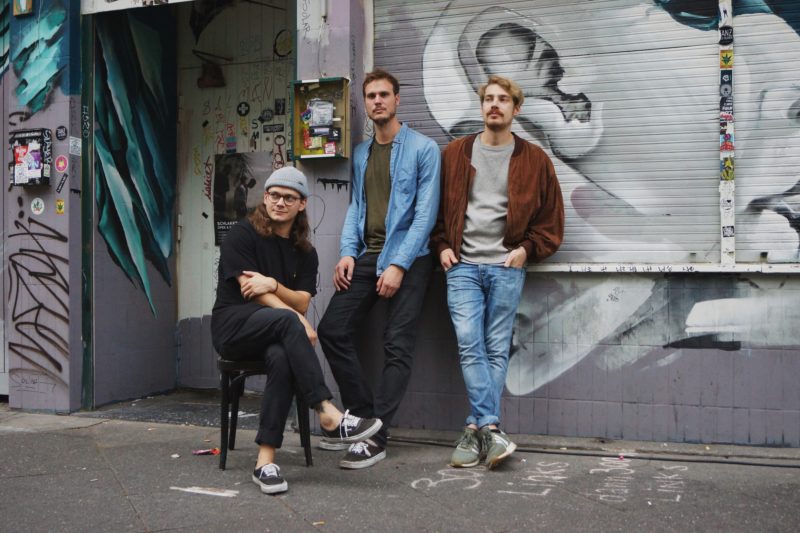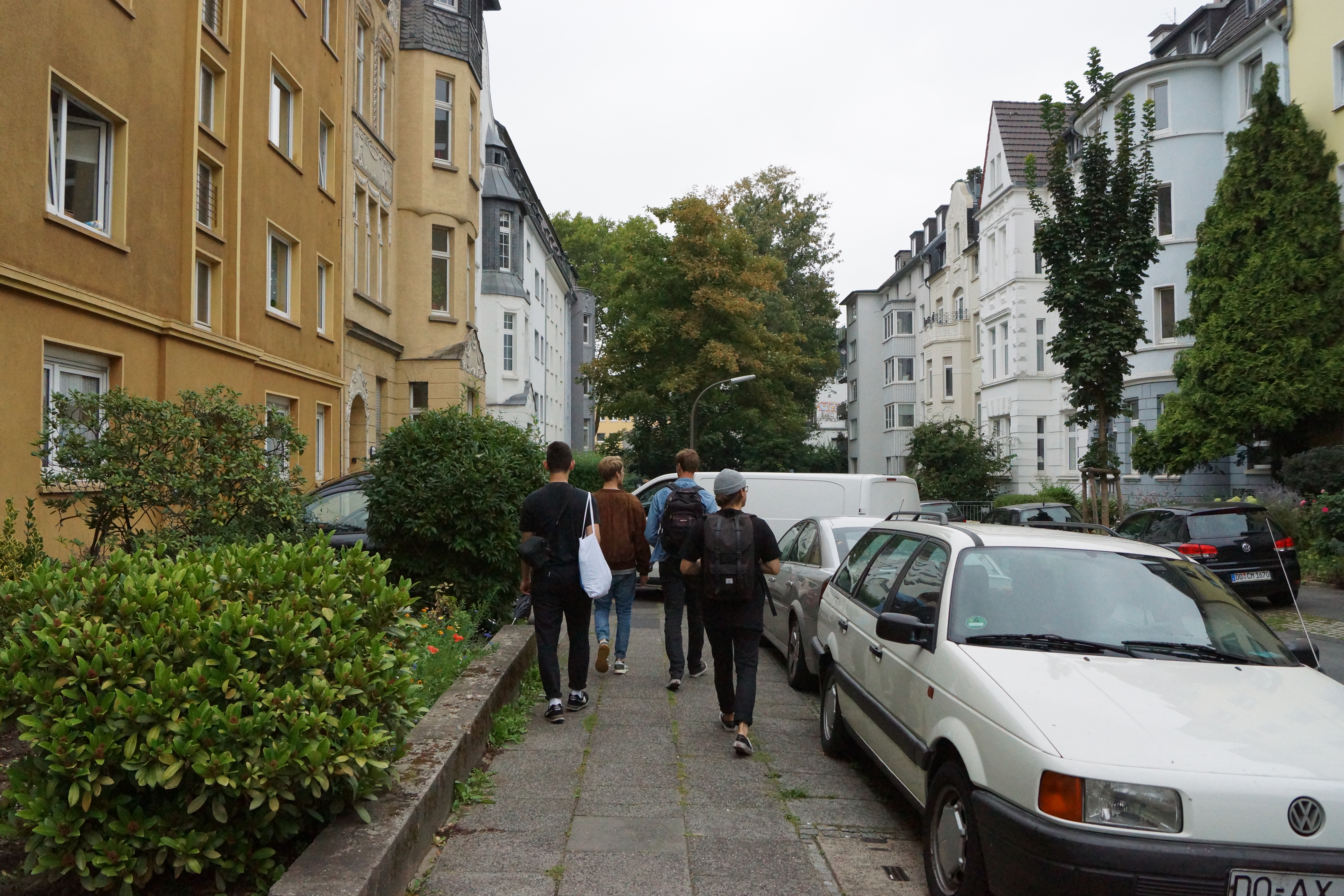
Walking through Kreuzviertel. Photo by Nicole Stieben
When in 2014, the Way Back When Festival appeared on the German festival circuit, hardly anybody had Germany’s eighth-largest city on the radar. For decades, Dortmund had been known primarily for its football team and the steel and coal industry, but in recent years, a surge in activity has embraced the city’s music scene: Small clubs like Rekorder, Sissikingkong and Oma Doris and concert promoters like Feine Gesellschaft (German for ‘High Society’) have managed to complement Dortmund’s existing live music infrastructure by luring more underground and up-and-coming bands to the city. This is part of a more general cultural awakening – once deemed deprived areas, Dortmund’s Nordstadt and dockland neighbourhoods have seen an influx of artists and students into what were previously working-class areas with a high number of immigrants, stimulating changes in both the style of living and outsiders’ perception of those quarters and the city at large.
The band I have asked to show me a glimpse of Dortmund’s new face have embarked on their own collective journey. Originally started as a fun project by two university students, Walking On Rivers have evolved into one of the city’s most successful music exports, touring around the country on the basis of an early demo and a string of live videos that has earned them a sizable audience on the way, also earning a popNRW price nomination on the way. While those videos displayed a variety of indie folk popularized by the likes of Fleet Foxes, Mumford & Sons or The Tallest Man On Earth, I soon learn that this was only a starting point for the band.
‘We are all big fans of Fleet Foxes, but in recent times, we’ve listened to a lot of older records of artists like Crosby, Stills and Nash, Dire Straits or Fleetwood Mac, and it’s obviously starting to seep into our music.’ – David Laudage, singer and bassist.
As we descend through the staircases and hallways of one of the many bunkers built in the city during World War II to Walking On Rivers’s rehearsal space, singer and bassist David Laudage recounts the string of events that brought them to this place. ‘We recorded our first demo in a friend’s bedroom, when the band didn’t even really exist’, David tells me. ‘We played our first concerts as a three-piece in living rooms back in 2015.’
‘It was just fun. We were like, ‘let’s play a bit’, and we just covered a lot of stuff – Elvis, Beatles, ‘Africa’ by Toto – we were sitting in the kitchen with my flatmate Florian [Weiss, the band’s guitarist, who was not present during the interview] and eventually started writing music to lyrics David and I had written. It just felt right.’ – Markus Kullmer, keyboarder and backing vocalist.
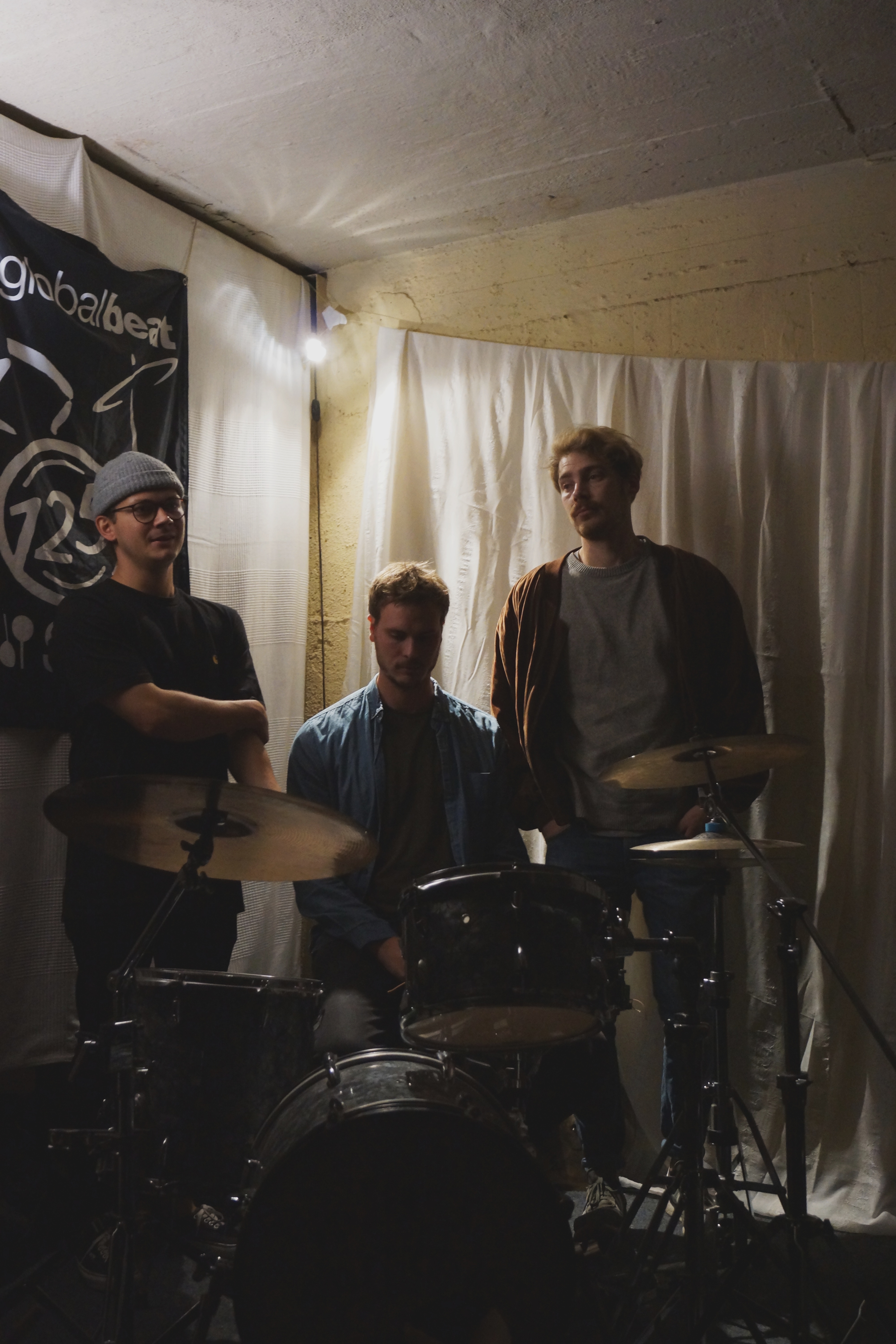
At the rehearsal space. Photo by Nicole Stieben
It was only when drummer Martin Kreuzer and guitarist Niklas Wiegand joined that Walking On Rivers felt ready to take the next step and properly record their first EP. ‘We’d not really been content with the way it sounded before – now it sounds like a proper band’, says David. On our way back to daylight, we make a brief detour to the facility’s machine room that still houses the generators from the time the bunker was built. ‘This is one of the few bunkers that is still largely in its original state. They do guided tours here from time to time’, Markus tells us. ‘These corridors are full of nooks and crannies – it’s really easy to get lost in here.’
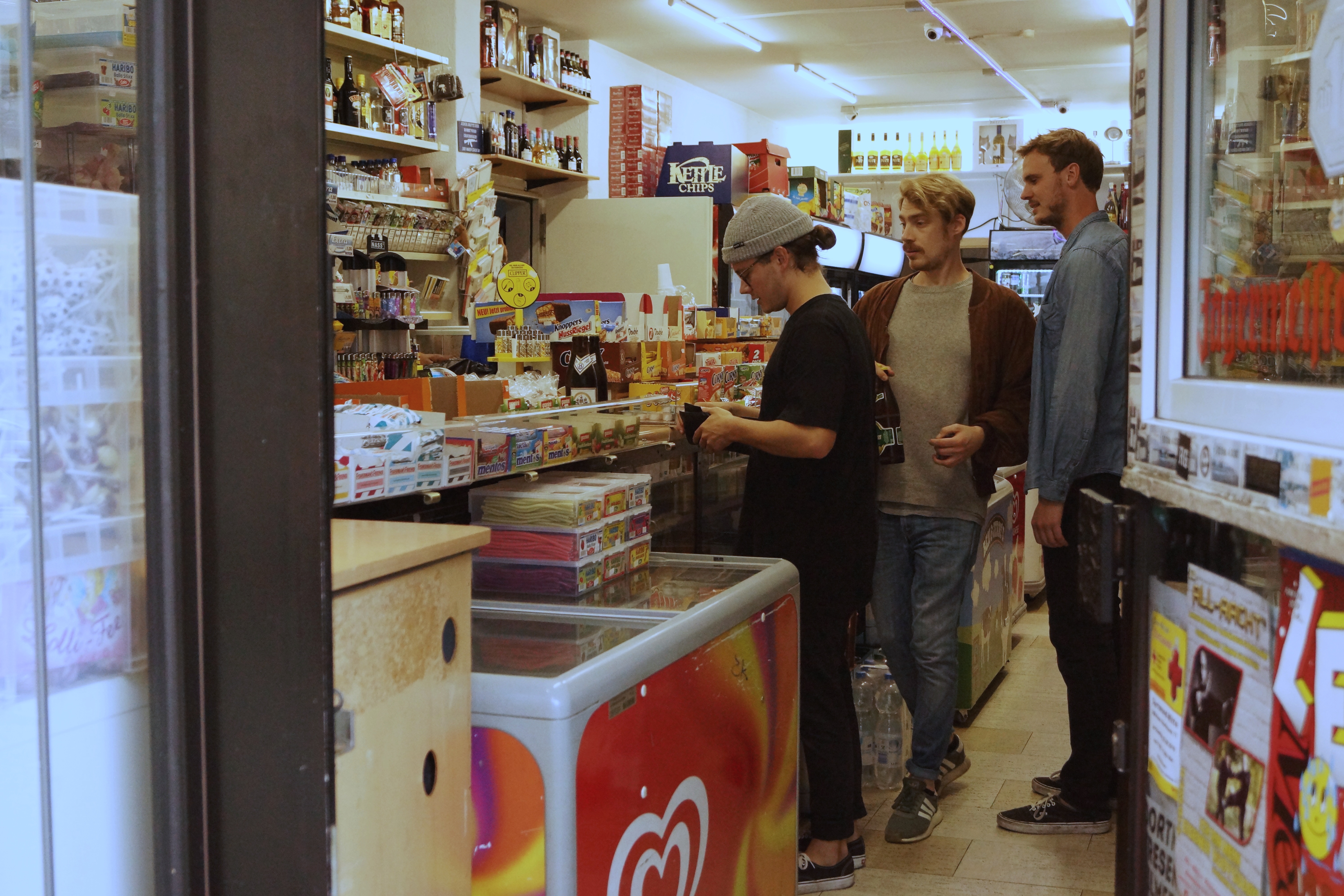
At a local kiosk. Photo by Nicole Stieben
Greatness and rubbish side-by-side
Back at the surface, we embark on a journey through the Kreuzviertel, a neighbourhood that has been popular with students, young families and more prosperous citizens. As in every larger city, gentrification has become an issue, but still, Dortmund doesn’t yet have an infrastructure like bigger cities in Germany. ‘You don’t have that much of an indie music scene here like there is in Cologne’, David explains. ‘There’s quite a bit stuff going on in Dortmund, but there’s also a lot of rubbish.’
‘The artists we like to listen to rarely ever come to Dortmund, although we have big venues like the FZW. You always have to travel to Cologne because most tours have a stay there.’
Entering a local kiosk to buy our first beers, David notes that it violates the ‘HP50’ criterion, explaining that at the Nordstadt kiosks, ‘they sell Hansa Pils for 50 cents’. We take a short break at nearby Möllerbrücke, the band’s spot of choice for hanging around, or ‘möllern’, as they say.
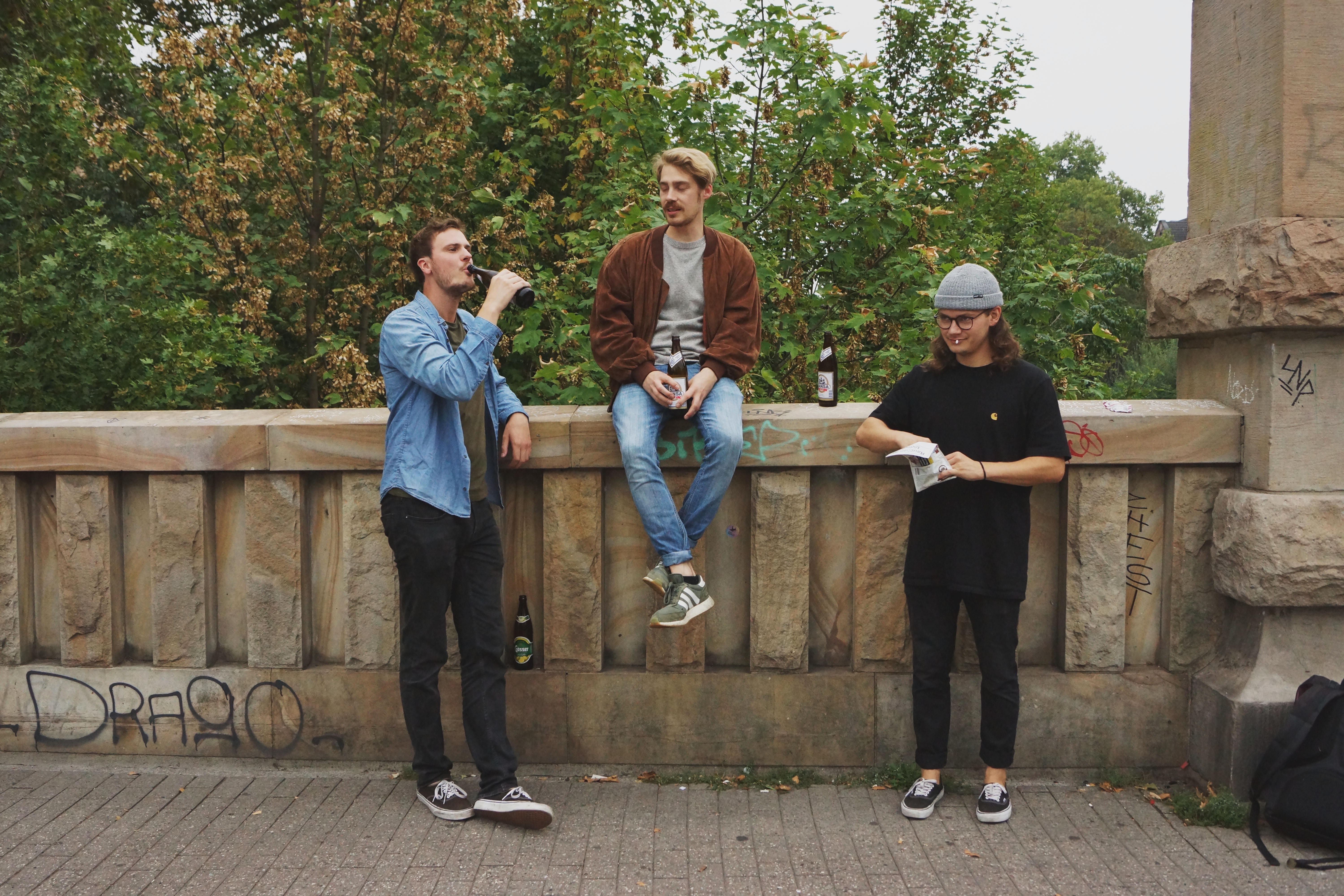
‘Möllern’ at Möllerbrücke. Photo by Nicole Stieben
A short walk takes us to Black Plastic record store. During Way Back When Festival, it will house one of urban culture’s special events at Unionviertel – musicians from the festival will talk about their favourite records, with locals presenting and discussing their vinyl collections. We enter the store for a short look at its sizable catalogue, which focuses on rock, metal and hardcore records from the last 50 years, and let Walking On Rivers select one record each.
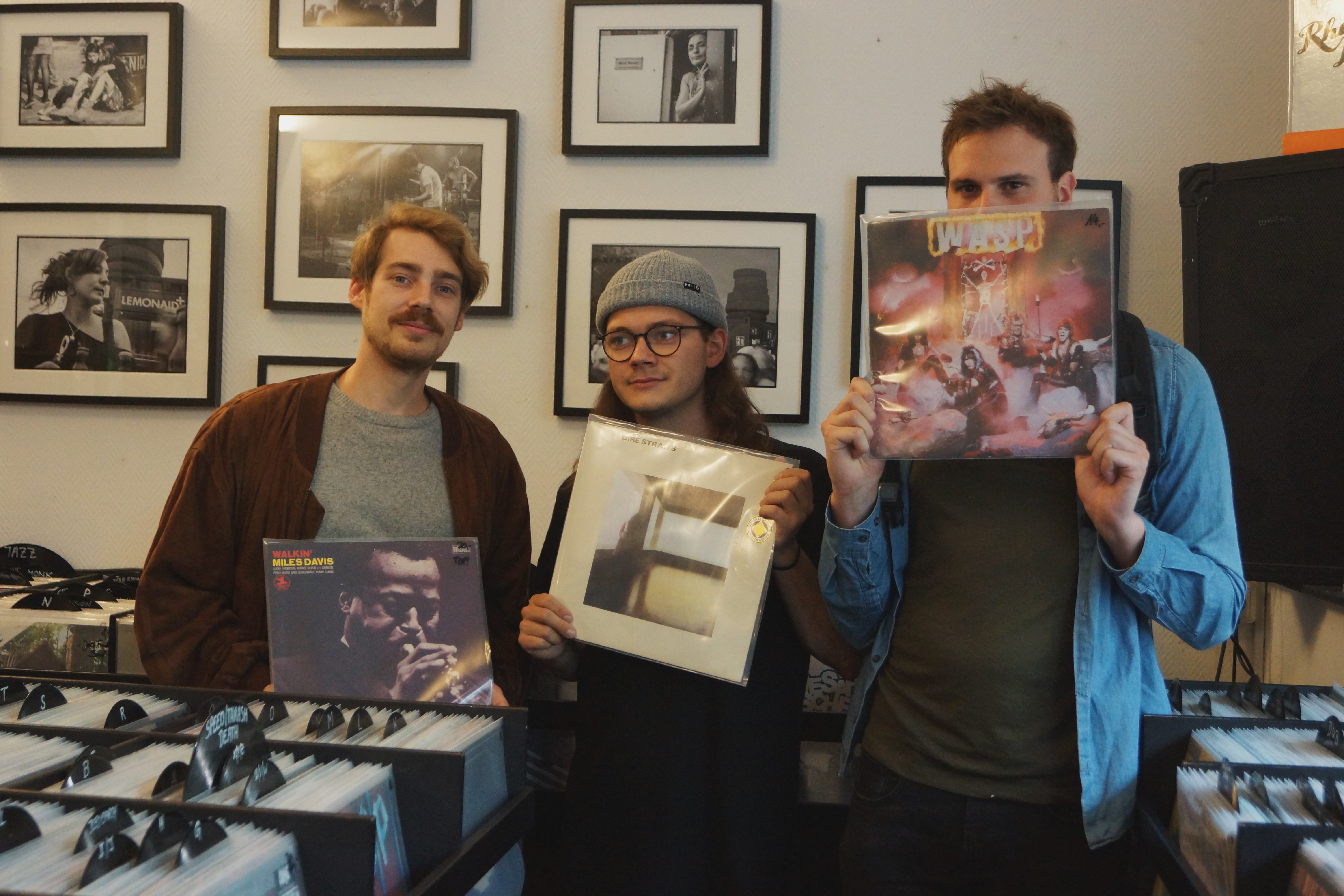
Walking On River’s vinyl choices at Black Plastic record store. Photo by Nicole Stieben.
The Unionviertel we are now in is noticeably less polished than the rather posh neighbourhood we had started our tour in – brownfields and remainders of abandoned industrial sites are in eyeshot just steps away from the main street. We walk past FZW, a cultural center and music venue that has in recent times attracted the likes of Interpol, Editors and Daughter, and which will house the bulk of concerts at Way Back When. On the other side of the road, next to Dortmund’s famed U-Tower, a brewery-turned-art museum, David notes a fanmade skate park that has just opened on an idle property.
It’s about space
Leaving the railway tracks behind us, we arrive in the dockland quarter named after the nearby docks that connect Dortmund to a trans-regional canal. Considerably more quiet than the Unionviertel, the quarter exudes a vibe that could be described as either down-to-earth or dreary. There’s a range of new venues, however, that are changing the reputation of the neighbourhood, one of them being the Sissikingkong. A restaurant and bar on ground level, a staircase leads you down into a basement room used for concerts newcomers and smaller established bands. It is not exactly well-suited for bigger bands though, as the small, narrow stage and its low ceiling make for an unfavourable view from the back rows. It’s for that reason that David notes:
‘There’s a lack of mid-sized venues in Dortmund. There are plenty of cool venues like Subrosa, Rekorder and Sissi that are well-suited for concerts with less than a 100 people, but the next-biggest venues are FZW’s club and Oma Doris at a capacity of around 300. There’s nothing in-between.‘
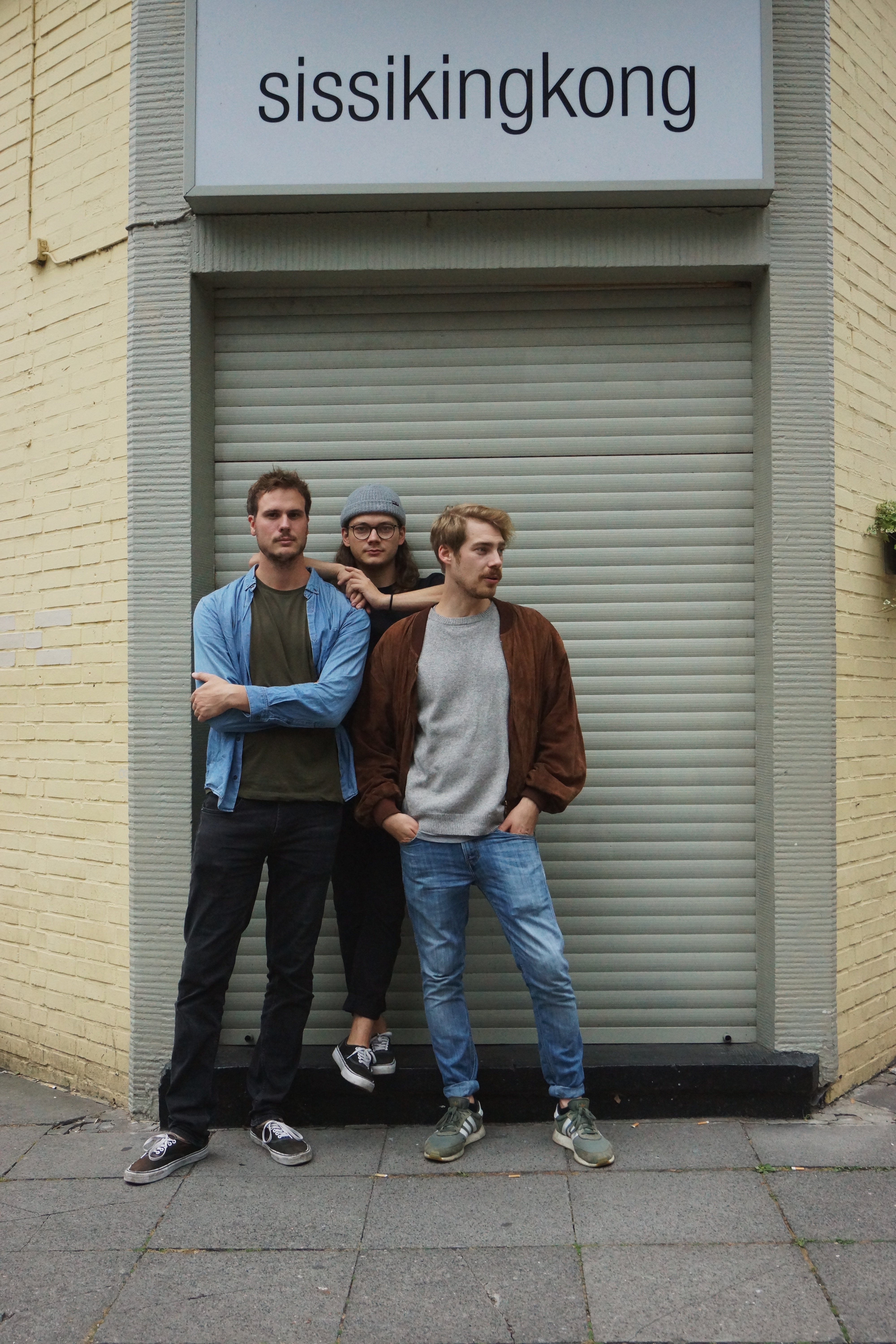
Sissikingkong. Photo by Nicole Stieben
The dockland’s recent surge in popularity is palpable as we stroll around the quarter towards our next destination. Amidst the ‘HP50’ kiosks and workers’ houses, we pass a queer-feminist pop-up store that serves as library and room for events. A little later, we are standing at the venue where Walking On Rivers played one of their first gigs. The Subrosa has made headlines recently when its owner cryptically announced he was looking for a new proprietor – after more than 25 years of live concerts and readings at the well-known bar, the news came as a big surprise to many.
‘We played here in November 2015. I think around 90 people showed up – you know, we told all of our friends to show to come round and stuff, and the venue ended up being packed.’
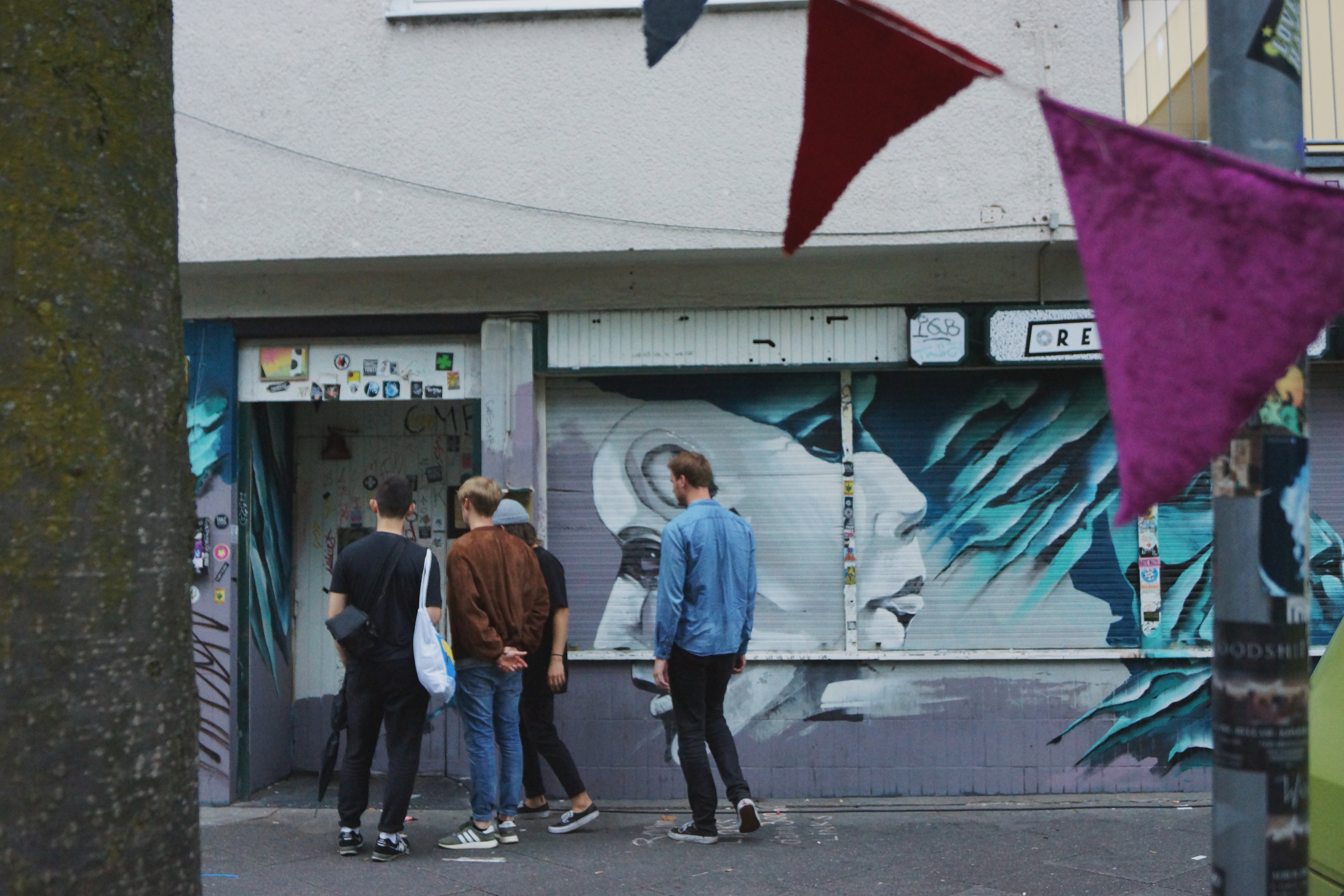
Standing in front of Rekorder. Photo by Nicole Stieben
Directly opposite lies the Rekorder, a small venue which is operated by ‘tonbande’ society, a collective of musicians, DJs, artists and writers, among others. As we are talking, a green caravan right next to the venue piques our interest. It turns out it belongs to two artistic directors who are staging a theatre performance in a shed just around the corner. The ‘musictheatrical simulation of an urban gold-rush mood’, which has been part of Ruhr-area theatre festival Ruhrtriennale, has temporarily renamed the Rekorder into Club Kohleausstieg (‘coal-mining phase-out club’), and obviously, a conversation about gentrification and its inevitability ensues. Apparently, it is only a matter of time until the quarter, with its burgeoning cultural scene, is swept away by big money and luxury renovations.
The scenery continues on our way to the actual docks – old industrial buildings around us are either abandoned or being renovated to house offices, with the odd residential building in between. It’s only at the actual waterfront that amidst the container port buildings, a range of interesting places comes into vision. On our side of the water lies the Umschlagplatz (‘terminal’), a bar that occasionally hosts art exhibitions in a converted freight container, whereas on the opposite side, at the Tyde Studios, concerts or other events take place occasionally, with the landmark of the docklands, the old port authority building, hovering beneath it. Speaking about memorable live venues and the industrial scenery in plain sight, the band immediately recount their gig at Traumzeit Festival in Duisburg, where they played in a semi-open casthouse. ‘It was a nice day all round’, Martin says.
As we sit down on the terrace of a defunct warehouse, where sometimes illegal techno raves take place, I ask the band about their upcoming EP. Produced by Alessandro Mara, who was also responsible for helping translate Frère’s wispy folk into a vibrant four-piece band, Walking On Rivers hope to move away a bit from the woods and meadows folk to a more immediate, punchy sound. ‘We’ve worked a lot with him on getting a bit more depth and atmosphere into our piano and guitar sounds’, David tells me, but still ‘it’s supposed to bang a bit live and call on people to dance a bit.’ I guess we are in for a surprise, I think to myself as I look across the waterfront.
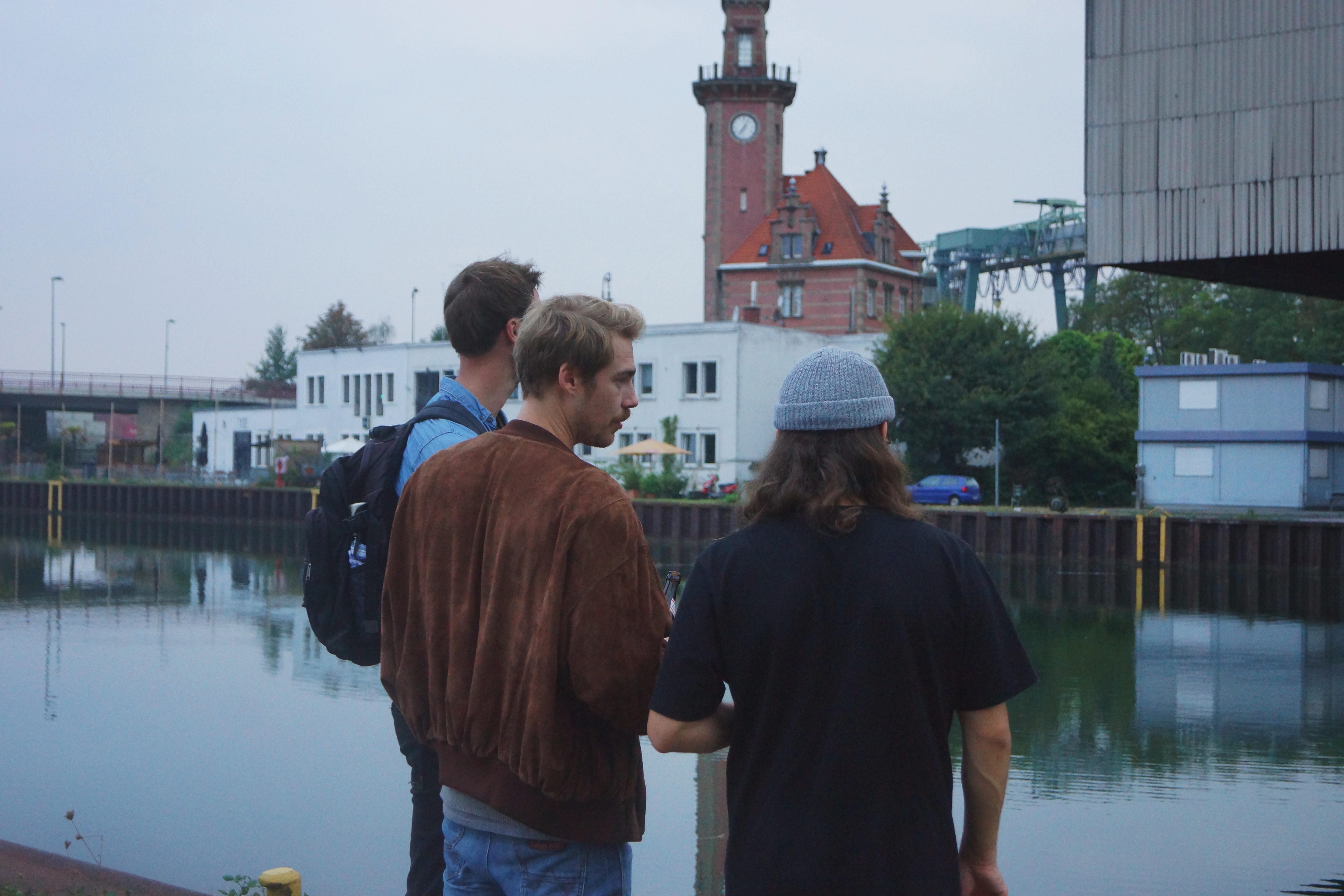
At the harbour. Photo by Nicole Stieben
Walking On Rivers are playing FZW Club at Way Back When Festival on Saturday, 5:45 PM. More information about the cosy festival can be found right here.
All photos taken by Nicole Stieben for NOTHING BUT HOPE AND PASSION.



